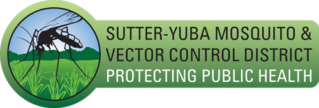Public Service Announcement For Immediate Release August 19, 2020 The Sutter County Public Health Branch and the Sutter-Yuba Mosquito & Vector Control District are issuing this joint press release subsequent to a detection of an invasive Aedes aegypti mosquito found in Yuba City, Sutter County Yuba City -The Sutter-Yuba Mosquito & Vector Control District (SYMVCD) has detected an Aedes aegypti mosquito in Yuba City in Sutter County, California. The detection was made on Tuesday, August 18 in a trap collected the morning of Friday, August 14, 2020. The SYMVCD is working to evaluate the extent of the infestation and will aggressively target problem areas to prevent its spread. Aedes aegypti is not native to California; however, it is a common mosquito in some urban areas of the southeastern United States and Arizona. Elsewhere in central and northern California, Aedes aegypti have recently been found in Stanislaus, San Joaquin, Placer, Sacramento and Shasta counties. Aedes aegypti has the potential to transmit several viruses, including those causing dengue, chikungunya, Zika, and yellow fever. These viruses are not currently found in California. Aedes aegypti is a small (about ¼ inch), dark colored mosquito with white markings that bites aggressively during the day. “Our goal is to control and eliminate this mosquito population.” said Stephen Abshier, SYMVCD manager. “We are doing everything we can to help ensure this mosquito does not become established in our communities.” The SYMVCD is deploying a variety of traps for adult mosquitoes and mosquito eggs surrounding the location where Aedes aegypti was found. The public can play a critical role in helping to control the spread of this mosquito population. Aedes aegypti lays its eggs just above the water line in small containers and vessels that hold water, such as dishes under potted plants, bird baths and feeders, ornamental fountains, tin cans, children’s toys, or discarded tires. It’s important for residents to look around their yard and outside their home and dump out even the smallest amount of standing water. Clean and scrub bird baths and pet watering dishes weekly and dump the water from overflow dishes under potted plants. The Yuba Sutter Public Health Officer, Dr. Phuong Luu, reminds people to do the following to reduce the chances of being bitten by mosquitoes: • Apply repellents containing EPA registered ingredients such as DEET, picaridin, oil of lemon eucalyptus, or IR3535 to exposed skin and/or clothing as directed on the product label. • Wear long sleeve shirts, long pants, socks and shoes outdoors when mosquitoes are most active. • Ensure window and door screens are in good repair so mosquitoes cannot enter your home. If you are sick with fever, headache, and joint or muscle pain after returning from an area where dengue, chikungunya, or Zika occurs, contact your doctor and stay indoors as much as possible to avoid mosquito bites and help prevent possible spread of the virus. Additional information on Aedes aegypti can be found: • By performing an internet search using keywords CDPH, invasive, and Aedes • Or at these web addresses: o https://www.cdph.ca.gov/Programs/CID/DCDC/Pages/Aedes-aegypti-and-Aedes-… o https://www.sutter-yubamvcd.org/invasive-mosquito-species-california Residents experiencing mosquito bites during the day should report them immediately to the Sutter–Yuba Mosquito & Vector Control District at 530 674-5456
